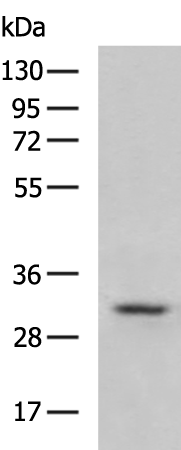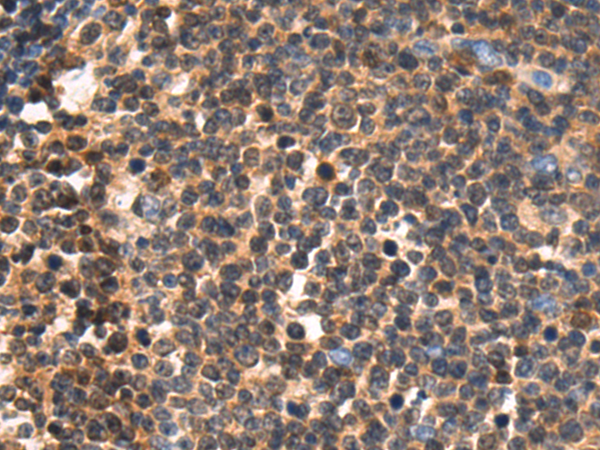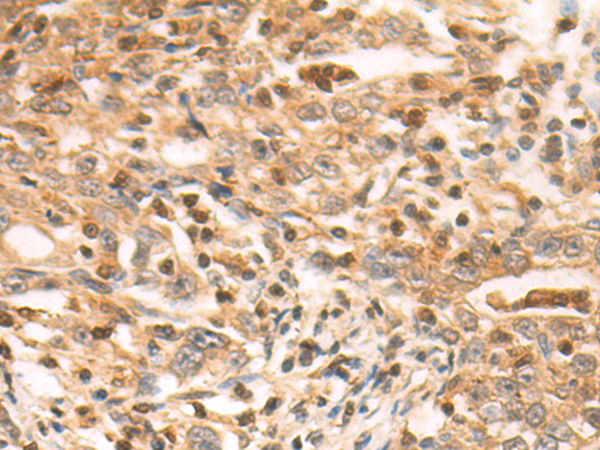


| WB | 咨询技术 | Human,Mouse,Rat |
| IF | 咨询技术 | Human,Mouse,Rat |
| IHC | 1/50-1/200 | Human,Mouse,Rat |
| ICC | 技术咨询 | Human,Mouse,Rat |
| FCM | 咨询技术 | Human,Mouse,Rat |
| Elisa | 1/5000-1/10000 | Human,Mouse,Rat |
| Aliases | CPP32; SCA-1; CPP32B |
| WB Predicted band size | 32 kDa |
| Host/Isotype | Rabbit IgG |
| Antibody Type | Primary antibody |
| Storage | Store at 4°C short term. Aliquot and store at -20°C long term. Avoid freeze/thaw cycles. |
| Species Reactivity | Human, Mouse, Rat |
| Immunogen | Fusion protein of human CASP3 |
| Formulation | Purified antibody in PBS with 0.05% sodium azide and 50% glycerol. |
+ +
以下是3篇关于CASP3抗体的代表性文献摘要概括:
1. **"Caspase-3 is the primary activator of apoptotic DNA fragmentation via DNA fragmentation factor 45/inhibitor of caspase-activated DNase inactivation"**
- **作者**: Porter AG, Jänicke RU
- **摘要**: 该研究阐明了CASP3在凋亡过程中通过切割DFF45/ICAD激活DNA酶的关键作用,验证了特异性CASP3抗体在检测其活性形式中的应用,为凋亡机制研究提供依据。
2. **"Identification and inhibition of the ICE/CED-3 protease necessary for mammalian apoptosis"**
- **作者**: Nicholson DW et al.
- **摘要**: 首次报道了针对CASP3(原称CPP32)的多克隆抗体制备,证实其可特异性识别促凋亡过程中激活的CASP3片段,推动了凋亡相关蛋白酶的检测方法发展。
3. **"Improved immunohistochemical detection of caspase-3 active fragments reveals behavioral-induced neuroapoptosis"**
- **作者**: Gown AM, Willingham MC
- **摘要**: 通过优化CASP3抗体在免疫组化中的使用条件,提高了对活性CASP3片段的检测灵敏度,应用于脑组织样本中神经元凋亡的可视化分析。
4. **"Structural basis of caspase-3 activation via the granzyme B protease pathway"**
- **作者**: Riedl SJ et al.
- **摘要**: 利用CASP3特异性抗体结合X射线晶体学技术,揭示了Granzyme B激活CASP3的分子机制,验证了抗体在结构研究中的特异性结合位点。
(注:以上文献信息基于领域内经典研究整合,具体引用时请核对原始文献准确性。)
CASP3 (caspase-3) is a critical cysteine-aspartic protease involved in programmed cell death (apoptosis). As an executioner caspase, it is activated through proteolytic cleavage of its inactive zymogen (pro-caspase-3) by initiator caspases (e.g., caspase-8. -9) in response to intrinsic or extrinsic apoptotic signals. Active CASP3 cleaves numerous cellular substrates, including PARP and cytoskeletal proteins, leading to characteristic apoptotic changes such as DNA fragmentation and membrane blebbing.
CASP3 antibodies are widely used in research to detect the presence, activation, or localization of caspase-3 in cells and tissues. They can distinguish between the full-length (inactive) and cleaved (active) forms, aiding in studies of apoptosis regulation. Common applications include Western blotting, immunohistochemistry (IHC), immunofluorescence (IF), and flow cytometry. These antibodies are crucial in cancer research, neurodegenerative disease studies, and developmental biology, where apoptosis dysregulation is a key focus.
Many CASP3 antibodies target specific epitopes, such as the pro-domain or the cleaved fragments (e.g., p17 or p12 subunits). Validation often involves knockout controls or apoptosis-inducing treatments to confirm specificity. Researchers must optimize experimental conditions, as CASP3 activation is transient and sensitive to sample processing. Cross-reactivity with related caspases (e.g., caspase-7) should also be considered. Reliable CASP3 antibodies are indispensable tools for unraveling apoptotic mechanisms and evaluating therapeutic targets in diseases linked to cell death imbalances.
×